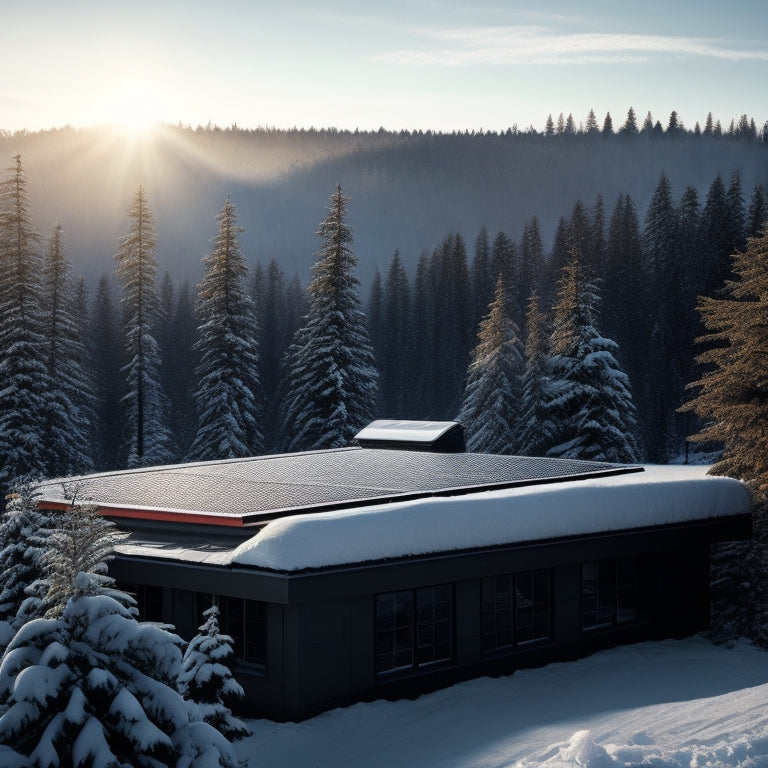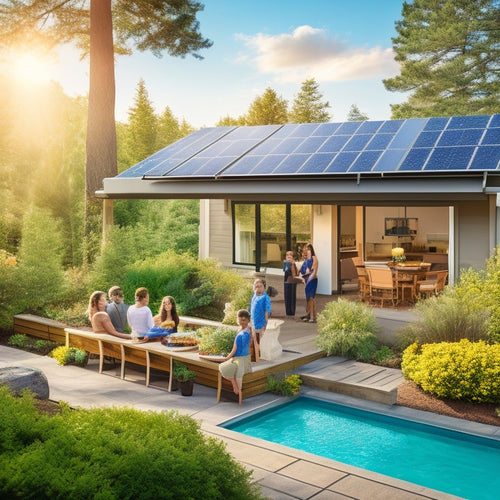
Heating Your Home With Solar Energy
Share
You can eliminate your reliance on traditional energy sources and utility bills by utilizing the power of solar energy to heat your home sustainably. A well-designed solar system can achieve zero energy costs year-round, especially with proper solar panel placement and tank sizing considerations. Solar thermal storage tanks and advanced insulation techniques also play an essential role in optimizing system performance. By considering your climate zone, house size, and energy demands, you can accurately size your system and maximize efficiency. As you investigate the benefits of solar heating, you'll find out how to access a future of financial freedom and reduced carbon emissions.
At a Glance
- Solar energy can eliminate utility bills by heating homes sustainably, achieving zero energy costs year-round with a well-designed system.
- Proper solar panel placement maximizes energy production for heating needs, increasing property value and reducing reliance on traditional energy sources.
- Solar thermal storage tanks are essential for optimizing solar thermal system performance and efficiency, balancing daily hot water needs with tank size considerations.
- Climate zone and house size directly influence required solar heating system size, with colder climates and larger homes needing larger systems.
- Solar energy reduces monthly expenses associated with utility companies, and with net metering, excess energy can be sold back to the grid, further offsetting costs.
Zero Energy Bills Possible
You can break free from energy costs by utilizing the power of solar energy to heat your home.
By switching to a renewable energy source, you'll not only reduce your carbon footprint but also increase property value through the installation of solar panels.
With a well-designed system, you'll no longer receive utility bills, enjoying zero energy costs throughout the year.
Free From Energy Costs
Solar panels utilizing the sun's energy can change your home into a self-sustaining oasis, liberating you from the burden of hefty energy bills. By utilizing the power of the sun, you can generate electricity and heat your home, reducing your reliance on traditional energy sources. This means you'll no longer be held hostage by fluctuating energy prices, giving you the freedom to allocate your resources as you see fit.
With an off-grid solar kit, you can solve three major problems that come with relying on the grid or generators: high energy costs, noisy and polluting fuel-based systems, and limited access to power in remote areas. Proper solar panel placement is key to maximizing energy production. By strategically positioning your solar panels, you can optimize energy output, ensuring you're generating enough power to meet your heating needs.
With energy independence within reach, you'll be free from the constraints of traditional energy suppliers, enjoying a sense of autonomy and self-sufficiency. As you bask in the warmth of your solar-heated home, you'll appreciate the financial freedom that comes with generating your own energy.
Zero Utility Bills
Every month, a significant portion of your paycheck disappears into the pockets of utility companies, leaving you with a dwindling bank account and a sense of financial insecurity.
However, with solar energy, you can break free from the shackles of high utility bills and enjoy the freedom of zero energy bills. By installing a home solar power battery, you can capture and store excess energy generated by your solar panels during the day, enabling you to power your home at night or during power outages without incurring additional costs home energy storage systems.
With net metering, you can even sell excess energy back to the grid and offset your energy consumption. This means you can drastically reduce your reliance on utility companies and minimize your energy expenses.
Thanks to solar incentives, the cost of installing a solar energy system has become more affordable. Additionally, maintenance costs are minimal, and the system can last for up to 30 years or more.
Reduced Carbon Footprint Guaranteed
By switching to solar energy, you're not only saving money on your utility bills, but you're also greatly reducing your reliance on fossil fuels and lowering your carbon emissions.
With residential solar power systems, you can generate renewable energy and reduce your energy consumption.
Additionally, solar power systems are designed to be efficient and durable, ensuring a long-lasting solution for your energy needs.
With solar power, you can utilize eco-friendly energy sources that produce no emissions or pollution, making it a cleaner alternative to traditional heating methods.
Eco-Friendly Energy Sources
Get ready to tap into a cleaner, greener way of living by shifting your focus to eco-friendly energy sources that guarantee a reduced carbon footprint. By embracing solar energy, you'll not only minimize your reliance on fossil fuels but also enjoy significant cost savings.
Renewable technologies have come a long way, and solar incentives have made it more accessible than ever. You can now utilize the power of the sun to heat your home, powering your daily life with a clean conscience.
Eco-friendly energy sources like solar power reduce your carbon footprint by avoiding greenhouse gas emissions. This means you'll contribute less to climate change and air pollution, creating a healthier environment for you and your community.
With solar energy, you'll enjoy independence from fluctuating energy prices and experience the freedom to live life on your own terms. By investing in renewable energy, you're investing in a sustainable future – one that's powered by nature, not fossil fuels.
Lower Emissions Today
As you shift to solar energy, you'll immediately notice a notable reduction in your carbon footprint, which translates to a substantial decrease in greenhouse gas emissions. This is an essential step towards a cleaner environment, and you're taking control of your energy independence.
By utilizing the power of solar energy, you're reducing your reliance on fossil fuels, which are major contributors to greenhouse gas emissions. With solar panels, you're generating clean energy, and this shift has a direct impact on the environment. You'll be producing zero emissions, and this means a healthier planet for future generations.
To encourage this eco-friendly move, governments offer solar panel incentives and rebates. These benefits can markedly reduce the upfront cost of installing solar panels, making it a more accessible option for homeowners.
As you join the solar energy revolution, you're not only reducing your carbon footprint but also saving money on energy bills. With solar energy, you're taking an essential step towards a cleaner, greener future – and that's a freedom worth fighting for.
Solar Thermal Storage Tanks
When designing a solar thermal system, you'll need to evaluate the size of your storage tank, as it directly affects the system's overall performance and efficiency.
You'll want to balance tank size with your daily hot water needs, considering factors like occupancy, climate, and insulation.
Additionally, incorporating renewable energy storage solutions can further optimize your system's performance and provide backup power during outages.
Depending on your specific requirements, you can choose from various system design options, such as single-tank, multi-tank, or hybrid systems, each with its own set of advantages and limitations.
Tank Sizing Considerations
Sizing your solar thermal storage tank correctly is crucial to maximize the efficiency of your solar heating system.
You'll want to take into account several factors, including your daily hot water usage, the number of people in your household, and the temperature you prefer your water to be. A general rule of thumb is to size your tank to provide at least 1.5 gallons of storage per square foot of collector area. However, this can vary depending on your specific climate and system design.
When selecting a tank, you'll also want to take into account the tank materials and insulation techniques used.
Look for tanks made from durable, corrosion-resistant materials like stainless steel or fiberglass. Additionally, opt for tanks with advanced insulation techniques, such as foam insulation or vacuum insulation, to minimize heat loss.
Properly sizing and selecting your tank will guarantee you have a reliable and efficient solar heating system that provides you with the freedom to enjoy hot water whenever you need it.
System Design Options
Beyond the tank itself, you'll need to contemplate the overall system design to guarantee optimal performance. This involves considering factors like solar panel orientation, which affects energy output and efficiency.
You'll also need to decide on installation methods, such as roof-mounted or ground-mounted systems, which impact system maintenance and cost.
Energy efficiency is critical, so you'll want to select equipment that minimizes heat loss and optimizes system integration. Conduct a thorough cost analysis to ascertain your system meets your budget and energy needs.
Stay up-to-date with technology advancements, as they can considerably improve system performance and reduce costs.
If you're comfortable with DIY installation, you can save on labor costs, but be certain to follow proper installation procedures to avoid compromising system integrity.
Performance monitoring is essential to identify potential issues and optimize system operation. By carefully considering these factors, you can design a solar thermal system that provides reliable, efficient, and cost-effective heating for your home.
System Size Calculation Factors
When calculating the size of your solar heating system, you'll need to take into account factors that impact energy demand and supply.
Climate zone considerations, such as your local temperature and insolation levels, play a significant role in determining the system's size.
Residential solar panels can greatly affect the system's capacity, especially when paired with energy storage units to guarantee a reliable supply of energy.
Additionally, the type of grid tie inverters used can also impact the system's overall efficiency.
Furthermore, the size of your house matters, as a larger home will require more energy to heat, which in turn affects the system's capacity requirements.
Climate Zone Considerations
Your location's climate plays a significant role in determining the size of your solar heating system. You'll need to take into account factors like temperature, sunlight hours, and heating degree days to guarantee your system can provide the necessary heat.
| Climate Zone | Average Temperature (°F) | Insulation Requirements |
|---|---|---|
| Very Cold | -22 to -15 | High |
| Cold | -15 to -5 | Medium-High |
| Moderate | -5 to 15 | Medium |
| Mild | 15 to 30 | Low-Medium |
In colder climates, you'll need a larger system to compensate for the increased heating demand. You can optimize your system's performance by confirming proper solar panel orientation and making insulation improvements to minimize heat loss. These upgrades will help you maximize your solar energy output and enjoy a cozier, more energy-independent home.
House Size Matters
Size up your solar heating system by factoring in your house size, as it plays a critical role in determining the required system capacity. Your dwelling's square footage, number of windows, and insulation importance all impact the amount of energy needed to heat your home. A larger house requires a more extensive solar panel array to generate sufficient heat, while a well-insulated home can get by with a smaller system.
When calculating your system's size, take into account the orientation and solar panel placement on your roof. A south-facing roof with minimal shading is ideal, as it allows for maximum energy absorption. However, if your roof receives partial shading, you may need to adjust the system size accordingly.
To guarantee your solar heating system operates efficiently, it's crucial to evaluate your house's heat loss and gain. This includes factors like window size, door orientation, and insulation R-value.
Higher Efficiency in Winter
You'll find that solar heating systems can achieve higher efficiencies in winter due to the colder temperatures, which increase the temperature difference between the collector and ambient air.
In cold climates, this increased temperature difference can lead to higher heat transfer rates, resulting in more energy being extracted from the sun.
Cold Climate Performance
Efficiency peaks when it's needed most: during the cold winter months when heating demands are highest. You'll be glad to know that solar panels can maintain their winter performance without significant drops in efficiency. In fact, solar panels often operate more efficiently in cold temperatures, making them ideal for heating your home during the winter.
Proper solar panel insulation is essential to guarantee peak performance in cold climates. By insulating the panels, you can reduce heat loss and maintain a consistent temperature, allowing the panels to generate more electricity.
Additionally, snow and ice can actually help improve solar panel performance by reflecting light and increasing the panel's energy output.
In extremely cold climates, you may need to take additional measures to guarantee your solar panel system operates efficiently. This can include using specialized winter-performance solar panels or incorporating a snow-clearing system to maintain peak energy production.
Frequently Asked Questions
Can Solar Heating Systems Be Used for Cooling My Home?
You can utilize solar cooling solutions to chill your home, using passive solar techniques like shading, insulation, and ventilation to reduce heat gain, and even incorporate evaporative cooling or absorption chillers for a sustainable, freedom-enhancing cooling solution.
Are Solar Heating Systems Noisy or Disruptive?
You're concerned about noise levels, but rest assured, modern solar heating systems are designed to be whisper-quiet, ensuring maximum solar heating efficiency without disrupting your daily life, giving you the freedom to enjoy a peaceful, sustainable home.
Do Solar Panels Require Frequent Cleaning and Maintenance?
You'll find that solar panels don't require frequent cleaning, but occasional dusting enhances solar panel efficiency; cleaning frequency depends on your location, with dusty areas needing more attention to maintain peak performance.
Can I Use Solar Heating With My Existing HVAC System?
As you weave a sustainable fabric, you'll find that seamlessly integrating solar heating with your existing HVAC system is a harmonious blend, optimizing HVAC efficiency and amplifying your eco-friendly stride, with solar heating integration being the key to a composition of energy savings.
Are There Any Government Incentives for Solar Heating Systems?
You're eligible for federal tax credits and state rebates when installing solar heating systems, which can greatly reduce your upfront costs; research and claim these incentives to maximize your investment's return and achieve energy independence.
Explore More
You've made it to the finish line! With solar energy heating your home, you can bid farewell to hefty energy bills and hello to a reduced carbon footprint. It's like having a superpower in your backyard, utilizing the sun's energy to keep your home cozy and warm. By considering factors like system size, thermal storage, and winter efficiency, you'll be well on your way to a zero-energy bill lifestyle. It's time to soak up the sun and reap the rewards of sustainable living!
Related Posts
-
Average Lifespan of Solar Battery Banks
The average lifespan of solar battery banks generally ranges from 5 to 15 years. This variation mainly stems from the...
-

Replacing Old Appliances With Sustainable Alternatives
Replacing old appliances with sustainable alternatives can change your home into an energy-efficient space. Not only ...
-

Top-Rated Home Solar Power Kits for Achieving Energy Independence
Top-rated home solar power kits enable you to achieve energy independence by greatly cutting your energy costs. You c...

